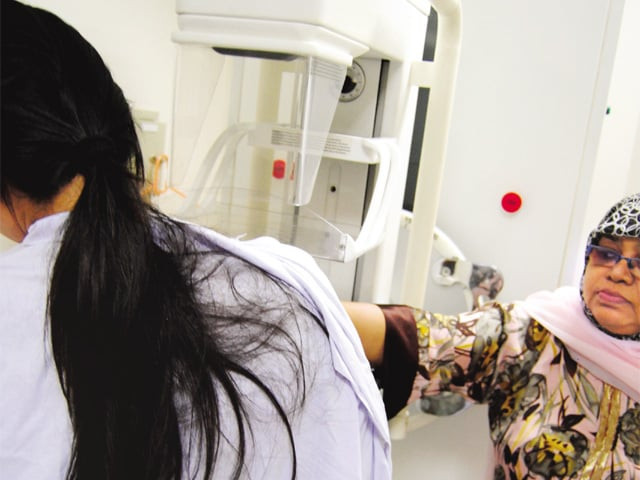Death from breast cancer more likely for Pakistani patients: US expert
Thirty to forty out of of every 100,000 people are likely to develop breast cancer in Pakistan.

She was speaking at a round-table talk on breast cancer awareness, risks and prevention, treatment and survivorship arranged at the Avari Towers by the US consulate, this week. By South Asian standards, Pakistan shows an unusually high incidence of a disease that was largely seen as one of the affluent in the West. Comparing Pakistan to India, she said that while one in every 22 women in India is likely to develop breast cancer, the risks amounts to one in every nine women for Pakistan.
Local estimates show that Pakistan sees almost 90,000 cases of breast cancer, resulting in almost 40,000 deaths per year. [This rate of mortality is as high as the US, that has the highest rate of cancer patients in the world. “This means that even if you are less likely to develop breast cancer in Pakistan, your death is more likely here if you develop it” she told.]
She explained that the incidence of the disease is higher in the US than in Pakistan mainly because lifestyle differences: “We eat more and reproduce less, which is not the case in Pakistan and other developing countries”. The growing rate of the disease in Pakistan is, thus, a matter that requires proper investigation, she concluded.
She also said that as obesity is a major cause of breast cancer in the West, coming generations in Pakistan can draw a lesson to avoid poor nutrition and over-eating.
Attempting to erase misconceptions, she said that men can also develop breast cancer, although they are less likely to do so than women, and that the disease can be passed down not only through the mother but also through the father, and Pakistan is one of the countries where incidence of breast cancer is observed to be growing more due to hereditary factors rather than lifestyle, although only proper research will yield firm conclusions. She said that “being a woman and getting older is all that you basically need” to develop breast cancer, although a family history of the disease increases the risk up to 60 per cent. The disease mostly affects older women although it can also affect young women and reproductive factors that contribute to high risk are never giving birth or being older at the time of the first birth, having menses at age 11 or earlier and experiencing menopause at age 55 or later, she said.
Most breast cancer cases in Pakistan are detected at stages III and IV. After these advanced stages, the cancer can reach the bones, neck, lymph nodes, arms, liver and lungs. According to the Pink Ribbon Campaign, without treatment, 75 per cent of breast cancer patients in Pakistan may die within five years while the rest are likely to die within the next five.
With the average age of occurrence of the disease being 53 in Pakistan, she recommended that women should go for scans from age 40, and get a physical examination every year.
TREATMENT
The different stages
- Stage I: Confined to the breast only
- Stage II: Breast and lymph nodes - operable
- Stage III: Breast and regional lymph nodes - inoperable
- Stage IV: Spread to distant parts of the body
MYTHS
This is not true:
- Breast cancer only affects older women.
- If breast cancer does not run in your family, you will not risk it.
- Only your mother’s family history of breast cancer can affect your risk
- Breast cancer is a contagious disease.
- Breast cancer can be a result of a curse/evil eye.
- Breast feeding increases the chance of breast cancer
Source: Pink Ribbon Campaign
Published in The Express Tribune, January 22nd, 2011.


















COMMENTS
Comments are moderated and generally will be posted if they are on-topic and not abusive.
For more information, please see our Comments FAQ